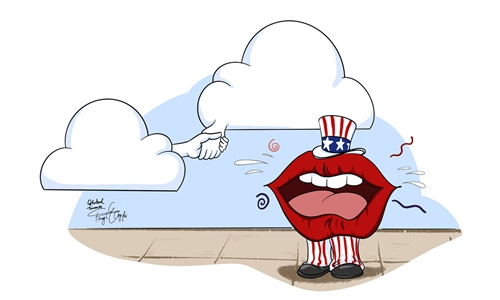Huawei pushes HarmonyOS in smart home sector amid rising barriers
Push for HarmonyOS 'forced move' against Washington's barriers

Huawei HarmonyOS Photo: VCG
Huawei on Tuesday announced a strategy that aims to attract more partners in the smart home sector for its self-developed HarmonyOS operating system (OS), a move that analysts said was forced, since installations of the OS on smartphones face increasing barriers amid a tightening US ban.
At the HarmonyOS Connect Partner Summit held in Shanghai on Tuesday, the Chinese telecommunications giant unveiled plans to upgrade and combine the two major brands of HUAWEI HiLink and Powered by HarmonyOS to HarmonyOS Connect, saying that it will continue to help partners to "make products, sell good products, and operate the products well."
"HarmonyOS is a smart terminal operating system created by Huawei for the era of the Internet of Things (IoT). It provides a unified language for the intelligence, interconnection and collaboration of different devices," Yang Haisong, vice-president of software department at Huawei's consumer business group, said at the summit on Tuesday.
"Through the upgrade, we are aiming to achieve technical certification and brand integration for our 1+8+N eco-partners' hardware products, and we are hoping that HarmonyOS' capabilities could become the base of an all-scenario smart ecosystem and offer cross-device experiences for consumers," said Yang.
Introduced in 2019, Huawei's 1+8+N refers to smartphones as the first numeral in the strategy. "8" stands for eight products - PCs, tablets, TVs, audio devices, glasses, watches, locomotives, and headphones - while "N" consists of third-party IoT devices such as smart home products.
The 1+8+N philosophy was described by Huawei as its overall strategy for the 5G era, and it's also widely considered as a self-rescue method to diversify the company's business operations as its smartphone businesses encounter challenges amid a US ban.
HarmonyOS Connect is equivalent to a brand for smart home devices, or the "N" layer, Jiang Junmu, a Shanghai-based veteran industry expert and a close follower of Huawei, told the Global Times on Tuesday. The upgrade mainly aims to build a "hardware friends' circle" for its HarmonyOS, said Jiang.
"The emphasis on smart home devices is a forced move - when its own smartphone share is shrinking, it can only step up efforts to attract third-party partners to expand the use of the OS," Ma Jihua, a veteran industry analyst, told the Global Times on Tuesday.
To strengthen its layout in the coming IoT era, the best option is to start from smartphones, which are the most portable devices that can control all smart products, said Ma.
Some major Chinese home appliance makers such as Midea, Joyoung and Robam have announced that some of their products will support HarmonyOS.
Ma said that in the smart home industry, Huawei also faces tough competitors such as domestic smartphone maker Xiaomi - which is now using Google's Android OS. Xiaomi didn't enter the smart home sector any earlier than Huawei, but it is seeing signs of taking over Huawei's smartphone shares in both overseas and domestic markets.
Huawei shipped 13.5 million smartphones in China in the first quarter this year, down 50 percent year-on-year, while the other three major brands such as Vivo, Oppo and Xiaomi, have all experienced double-digit growth, according to market research firm Canalys.
Xiaomi's market share in Europe surpassed that of Apple in the first quarter of 2021, ranking second behind Samsung. It was the first time that Xiaomi's market share had ranked second in Europe, according to Zeng Xuezhong, vice president of Xiaomi.
"Given Xiaomi's staggering shipment growth, it's possible that Google's Android OS will still dominate the OS market in the coming IoT era, posing more challenges for Huawei's HarmonyOS to attract partners," Ma said.
There are still options for Huawei, as the chip shortage is now a common problem for all industry players and popularization of 5G is progressing slower than expected, analysts said. These factors may give Huawei some time to catch its breath and fix loopholes, they added.

